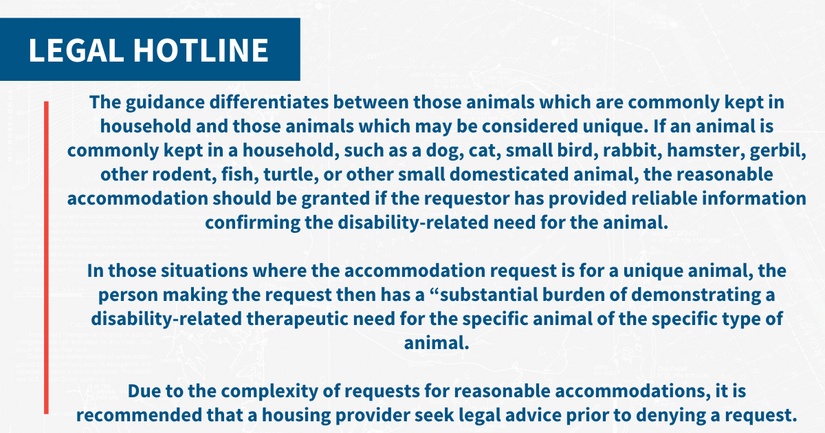Legal Hotline: What Does the New Guidance From HUD on Assistance Animals Mean?
August 18, 2020 Legal Updates
The guidance issued by HUD on January 28, 2020 explains how housing providers should handle requests for reasonable animal-related accommodations to comply with the Fair Housing Act The full guidance can be found here: https://www.hud.gov/sites/dfiles/PA/documents/HUDAsstAnimalNC1-28-2020.pdf.
While this notice does not change the law, it clarifies how to handle circumstances that are often confusing. The guidance includes a step by step analysis for requests for a reasonable accommodation for an assistance animal, specifically noting the differences between service animals (i.e. dogs trained as guide dogs) and emotional support animals and what questions a housing provider may ask in each situation.

Of particular note, the guidance differentiates between those animals which are commonly kept in household and those animals which may be considered unique. If an animal is commonly kept in a household, such as a dog, cat, small bird, rabbit, hamster, gerbil, other rodent, fish, turtle, or other small domesticated animal, the reasonable accommodation should be granted if the requestor has provided reliable information confirming the disability-related need for the animal. In those situations where the accommodation request is for a unique animal, the person making the request then has a “substantial burden of demonstrating a disability-related therapeutic need for the specific animal of the specific type of animal.”
Additionally, as a best practice, the guidance recommends that individuals seeking a reasonable accommodation for an assistance animal have their health care professional provide the following information:
(1) whether the patient has a physical or mental impairment;
(2) whether the patient’s impairment(s) substantially limits one or more major life activity or major bodily function; and
(3) whether the patient needs the animal.
Further, if the request is for a unique animal, the following information would be helpful in supporting that request:
(1) the date of the last consultation;
(2) any unique circumstances justifying the need for the particular animal; and
(3) whether the health care professional has reliable information about the specific animal or whether they specifically recommend the animal.
Keep in mind, however, that the aforementioned items are not required.
Due to the complexity of requests for reasonable accommodations, it is recommended that a housing provider seek legal advice prior to denying a request.
